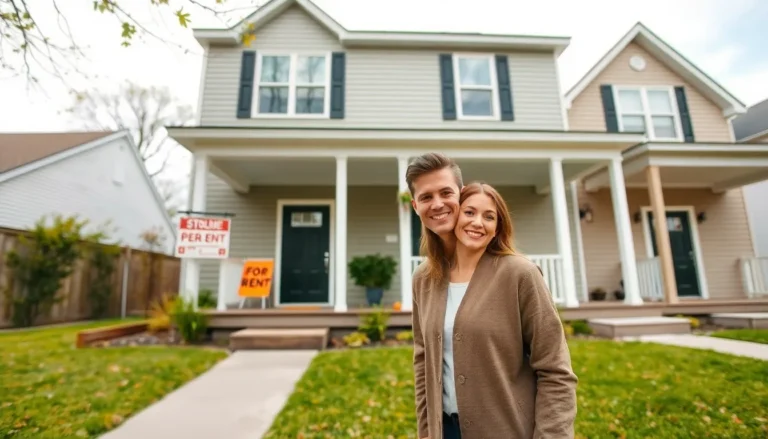Table of Contents
ToggleEver dreamt of living for free? Welcome to the world of house hacking, your ticket to financial freedom without resorting to selling your kidney on the black market. Whether you’re a seasoned investor or just dipping your toes into the property pond, house hacking is an innovative way to boost your income while enjoying the comfort of home. In this guide, we’ll decode the ins and outs of house hacking, exploring everything from its benefits to financing options. So, buckle up and let’s get hacking.
What Is House Hacking?

House hacking is a savvy strategy that involves using your property to generate income. Typically, this means renting out part of your home, whether it’s a room, a basement, or even a separate unit. The aim? To cover your mortgage or significantly reduce your monthly living expenses. In simpler terms, it’s like Airbnb-ing your life while still having a place to crash at the end of a long day. Imagine living it up in your favorite neighborhood without the burden of crippling rent, it’s not just a dream but a reality for many people making the most out of their living spaces.
Benefits of House Hacking
The benefits of house hacking are as plentiful as the number of roommates who’ll inevitably use your shower without replenishing the toilet paper. First, you can drastically reduce, or even eliminate, your housing costs. By bringing in rental income, many house hackers are able to cover their mortgage payments and utilities, leaving extra cash to spend on fun things, like that Netflix subscription you always forget to cancel.
Also, house hacking offers financial flexibility. This strategy allows homeowners to build equity in their property while income pours in from tenants. As property values rise, house hackers find themselves sitting on a wealth of assets. Also, it fosters a sense of community that renting an entire apartment often lacks. Sharing space can lead to friendships and vibrant living experiences, making it more than just a financial decision.
Different Methods of House Hacking
House hacking can take several forms, each with its own unique flavor.
Renting Out Rooms
This is the most straightforward method. Homeowners simply rent out spare bedrooms to long-term tenants or short-term guests.
Multi-Family Properties
If someone is feeling particularly ambitious, purchasing a multi-family property can be a lucrative route. They can live in one unit while renting out the others.
Airbnb and Short-Term Rentals
For those who prefer a more dynamic income stream, converting part of the property into an Airbnb can be an exciting venture. This option allows homeowners to adjust rental pricing based on demand, maximizing earnings.
House Hacking with Friends
Why not group up with friends? Renting a larger property together not only splits costs but can also enhance the living experience. That way, they can enjoy the perks of homeownership without very costly.
Tips for Successful House Hacking
Want to hop on the house hacking train but unsure where to start?
- Do Your Research: Understand your local rental market. Knowing the demand will help in setting the right rental price and attracting tenants.
- Choose Wisely: When selecting tenants, background checks can save a world of headaches down the line. Don’t rush the process.
- Maintain Open Communication: Setting clear boundaries with tenants can mitigate misunderstandings. After all, sharing space shouldn’t lead to passive-aggressive note wars.
- Consider House Rules: Establishing house rules upfront helps maintain a harmonious living environment. Everyone will be on the same page, from cleaning schedules to guest policies.
- Document Everything: Keep records of agreements, payments, and maintenance issues to cover your bases and safeguard against potential disputes.
Financing Your House Hacking Project
Financing is perhaps one of the most critical elements of house hacking. Without the right financial strategy, it can become like building a sandcastle during high tide.
Traditional Mortgages
Most homeowners opt for conventional loans. These are adjustable-rate mortgages, fixed-rate loans, or FHA loans that come with low down payments, especially for first-time homebuyers.
FHA Loans
These are great for those looking to secure a property with a smaller down payment. They allow homeowners to live in one unit while renting the others, perfect for house hacking.
Home Equity Lines of Credit (HELOC)
For those already invested in a home, tapping into a HELOC can provide the needed funds to turn a primary residence into a profitable rental property.
Legal Considerations and Regulations
Navigating the legal landscape is a must for successful house hacking. Ignoring laws might turn a money-making operation into a legal headache.
Zoning Laws
Before renting out any part of your property, check local zoning laws. Some areas have strict regulations on rentals, especially short-term ones, that can result in fines.
Lease Agreements
Having a solid lease can protect both parties. Clearly outline terms related to rent, guests, and maintenance responsibilities to avoid conflict down the road.
Taxes and Insurance
Understand how rental income impacts your taxes. Consulting with a tax professional can empower house hackers to maximize deductions while staying compliant.
Real-Life House Hacking Success Stories
Let’s take a look at a few inspirational success stories.
The Young Family: They purchased a duplex and lived in one unit while renting the other. Within a few years, the rental income covered their mortgage, allowing them to save for a family vacation.
Sara’s Airbnb Adventure: She transformed her basement into a cozy Airbnb that brought in almost double her mortgage payment every month. Now, her travel plans are funded by the very guests she hosts.
These real-life experiences exemplify the incredible potential of house hacking. From young families to solo adventurers, anyone can find a path towards financial freedom.







